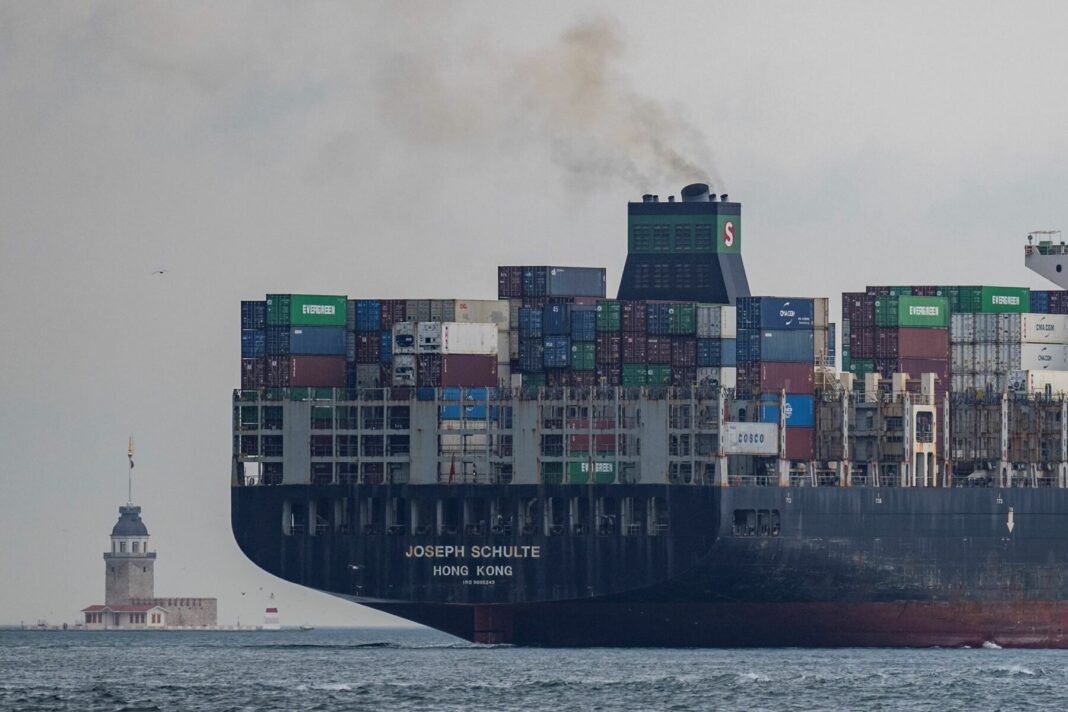Turkey’s trade ministry said on Tuesday that ships sailing from Turkey to Israel which can be tracked using maritime traffic data are carrying goods that were declared before Turkey imposed trade restrictions on Israel on April 9, responding to claims by investigative journalist Metin Cihan that the restrictions were not being enforced.
Six months after Israel launched its war on Gaza, the Turkish government heeded public criticism and imposed restrictions on its ongoing trade with Tel Aviv last week.
The move to restrict trade came in response to Israel’s actions in Gaza and its blocking of Turkey’s attempts to airdrop aid into the region.
The restrictions specifically target 54 products, including cement and iron and steel construction materials.
The Turkish trade ministry stated that these measures would stay in place “until Israel declares a ceasefire and allows an adequate and uninterrupted flow of humanitarian aid into Gaza.”
Tracking maritime traffic, Cihan said on X that trade between Turkey and Israel remains robust, with ships such as the Kazime Ana, operated by Sabancı Holding subsidiary Akçansa, regularly transporting cement to Israel, which is among the 54 items restricted by the trade ministry. Cihan pointed out that this ship is currently on its way to Israel and has already made several trips since the sanctions were imposed.
According to Cihan, this ongoing activity indicates that trade between the two countries is largely continuing as usual despite the announcement of restrictions.
The trade ministry, however, countered these allegations by stating that the goods on these ships were all declared before the restrictions were implemented and that no new export declarations have been made for the restricted items since April 9.
Ticaret Bakanlığı’nın 9 Nisan 2024 tarihinde yayınladığı İsrail ile ihracat kısıtlamasına tabi olan 54 ürün grubundaki 1019 ürüne, 9 Nisan 2024, saat 09.00’dan itibaren gümrüklerimizde ihracat tescil işlemi kesinlikle yapılmamaktadır.
Ayrıca söz konusu 1019 ürünün, antrepolar,…
— T.C. Ticaret Bakanlığı (@ticaret) April 16, 2024
“The declaration of these items was completed before the April 9 embargo, and their shipment does not violate the newly imposed trade restrictions,” the ministry clarified in a statement posted on X. It also claimed that stringent checks are in place to ensure compliance with the export regulations.
The ministry urged the public to trust the enforcement of the trade restrictions. “We ask our citizens not to believe misleading information and to trust that our measures against the export of the listed products to Israel will be enforced in accordance with international trade laws,” the ministry’s statement said.
“As the Republic of Turkey, we have stood by our Palestinian brothers and sisters from day one and will continue to support them on every platform,” the ministry said.
Anti-Israel sentiment has been running high in Turkey since Israel began pounding Gaza in retaliation for an unprecedented attack by militant group Hamas in the south of Israel on October 7, which claimed around 1,200 lives and led to the taking of some 250 hostages.
As of April 6, 133 hostages remained in captivity in the Gaza Strip, 129 of whom had been abducted on October 7.
The death toll in Gaza, meanwhile, has exceeded 34,200, according to the Gaza Health Ministry.
After EXPORTING $5.4 BILLION in goods to ISRAEL in 2023, President Erdogan has launched a TRADE WAR on ISRAEL. pic.twitter.com/FzYwKhKTwW
— Jackson Hinkle
(@jacksonhinklle) April 10, 2024
The trade between Turkey and Israel, some of which is conducted by people close to President Recep Tayyip Erdoğan despite his anti-Israel rhetoric, was first revealed by Cihan in late November. Cihan has since then been reporting on the commerce between the two countries using official statistics and maritime traffic websites, all of which are publicly available.
In response to the ministry’s statement, Cihan pointed out inconsistencies and raised questions about the actual enforcement of the newly imposed trade restrictions.
Cihan interpreted the ministry’s latest statement under the premise that all the information provided was accurate. He noted that the ministry announced for the first time that 1,019 products, including items used by Israel for military purposes, were subject to trade restrictions that were introduced only six months after the start of the conflict in Gaza.
Cihan pointed out that the ministry’s confirmation that shipments of products declared prior to the restrictions are continuing indicates that shipments, especially of products such as cement, are still ongoing. This contradicts previous claims of a complete halt to shipments to Israel.
He also criticized the inconsistency of previous statements by official sources and the pro-government media, which tried the spin the story by denying the ongoing trade, claiming it was only the private sector doing it and spreading misleading information about the destination of the goods. Cihan suggested that previous propaganda and how it all turned out to be lies make people suspicious of the authorities’ new announcements and that it might be the case that trade is continuing unabated and is being obscured by misinformation.
Erdoğan, who long marketed himself in the Muslim world as the champion of Palestinian rights and a strong critic of Israel, has repeatedly accused Israel of being a “terrorist state” and committing “genocide” in Gaza due to Israel’s ongoing attacks on the Palestinian enclave.
He even compared Israeli Prime Minister Benjamin Netanhayu to Adolf Hitler.
Despite his anti-Israel rhetoric, Erdoğan has faced accusations of hypocrisy due to the ongoing trade between Israel and Turkey that has shown no signs of winding down at the height of Israel’s war on Gaza and to some extent is conducted by people close to Erdoğan and his family.
The ongoing conflict and Erdoğan’s condemnation notwithstanding, Israel remains an important trading partner for Turkey, ranking 13th on Turkey’s export list in 2023. Trade between the two countries totaled $5.42 billion last year, accounting for 2.1 percent of Turkey’s total exports, a decrease from $7 billion in 2022.
Data from the Turkish Ministry of Transportation shows that between October 7 and December 31, 2023, an average of eight ships per day made a total of 701 trips from Turkish ports to Israel. Of these, 480 sailed directly, while 221 used Turkey as a transit country. Notably, Turkish exports to Israel rose to $430.6 million in December, an increase of 34.8 percent compared to November, indicating a continued and even growing economic relationship despite the political rhetoric.
The Turkish Statistical Institute’s Foreign Trade Statistics Database showed items exported to Israel included precious metals, chemicals, insecticides, nuclear reactor parts, gunpowder, explosives, aircraft parts and weapons and ammunition.
Fearless reporting
Cihan, who had to leave Turkey due to his reporting and has become a powerhouse of investigative journalism through his X account, was given a special award in absentia in his home country.

Turkey is known as one of the top jailers of journalists in the world and ranks 165th among 180 countries in the Reporters Without Borders (RSF) 2023 World Press Freedom Index, which was released in early May.
Cihan’s investigations, involving highly sensitive issues such as the suspicious death of 11-year-old Rabia Naz Vatan, the alleged infiltration of the state apparatus by the pro-government Turkey Youth Foundation (TÜGVA) and the ongoing trade between Turkey and Israel that includes the inner circle of Erdoğan despite the president’s anti-Israel rhetoric, have brought him to the forefront of critical journalism in Turkey.
He was recognized for his significant contributions to journalism at the 27th Metin Göktepe Journalism Awards ceremony held in İstanbul.
Cihan’s award was presented by fellow journalist and jury member Filiz Gazi to Kazım Kızıl, who accepted it on his behalf.
In his message, Cihan expressed his pride in receiving an award named after Metin Göktepe, a Kurdish photojournalist who was tortured and murdered in police custody in İstanbul in 1996 while covering a funeral for inmates killed in prison riots.
Cihan dedicated his award to the journalists who lost their lives in Gaza due to attacks by the Israeli military, pointing to the ongoing risks and sacrifices faced by journalists in conflict zones.





